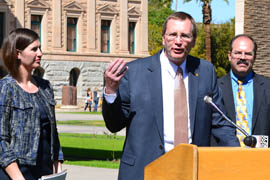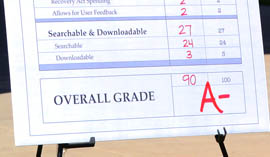Cronkite News has moved to a new home at cronkitenews.azpbs.org. Use this site to search archives from 2011 to May 2015. You can search the new site for current stories.
Advocacy group gives Arizona an A-minus in spending transparency
PHOENIX – An advocacy group gives Arizona an A-minus on how it helps taxpayers research online how and where state government spends their money.
The Arizona Public Interest Research Group said that’s largely because of a website, OpenBooks.az.gov, that offers a searchable database of state expenditures.
Serena Unrein, public interest advocate for Arizona PIRG, said that website serves as a model for government transparency.
“We’re here to promote one-click, one-stop government spending transparency that is easily accessible,” she said at a a news conference Wednesday with two state officials.
The group timed the release with Sunshine Week, a national effort to promote open government.
The launch of OpenBooks raised Arizona’s grade from an F in 2010 to A-minus in 2011.
Unrein and Byron Schlomach, an economist with the Goldwater Institute, an independent watchdog group that promotes limited government and free enterprise, said Arizona could raise its grade by expanding OpenBooks to include information from local governments.
“Adding local transparency will catapult Arizona to the top of the As,” Schlomach said.
D. Clark Partridge, state comptroller and the official responsible for OpenBooks, said he was pleased to see the website to get such recognition.
“It’s up to us to help people understand what the government is doing,” he said. “We don’t have all the information, but we can direct people to where to find it.”
Rep. Kimberly Yee, R-Phoenix, who has sponsored legislation aimed at increasing government transparency, said it couldn’t be more important for records to be open at every level.
“People need to see where money is being spent so they can hold elected officials accountable,” Yee said. “Arizona has made great strides in this area and will continue forward.”
Despite efforts to date, Arizona still has room for improvement, said Robert Leger, former national president of the Society of Professional Journalists and an assistant editorial editor at the Scottsdale Republic. For example, he said, while spending may be reported that might come too late to be helpful.
“The more light there is the more difficult it is for those with less noble intentions getting their fingers into the money,” Leger said in a telephone interview.
David J. Bodney, a media attorney who is managing parter of the Phoenix office of Steptoe & Johnson LLP, said that Arizona law requires the maximum amount of information and transparency about state spending.
“There may be a gap between the law and compliance with it, but the law protects the public’s right to inspect spending,” he said in a telephone interview.
Bodney said OpenBooks does a good job of addressing government spending on the state level but access to information on community and county governments often is lacking.
“Too many local governments websites are indecipherable and difficult to navigate and they effectively conceal basic information about government activity,” he said.
Daniel C. Barr, a media attorney who works with the Arizona First Amendment Coalition, said OpenBooks and a general embrace of government transparency are different things.
“The website doesn’t mean government is supportive of public access across the board,” he said in a telephone interview. “For example, it has nothing to do with how Maricopa County responds to public information requests.”








